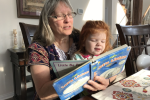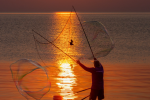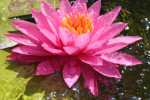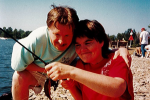In each of us there is a place where we go in the middle of chaos to escape from the fray. It is that “home” place, that hiding place, that soft place where no memories of it come with ragged edges and no thought of it is tinged with fear. It’s an empty beach, perhaps. Or a hidden place on the bluff above town where we remember being able to see everything while no one could see us.
For some it is the thought of the first blooming of a first garden. For others it is a secret spot under the back porch that smelled of clean earth. For many it’s a hiding place in the basement or the shed or in a copse of trees along the road. It’s that place to which we return in our minds to change life in the middle of too much life for us to take just then.
It is the place of our dreams and the hope of our hopes.
It’s that natural place within us where the roar of the water or the silence of the mountains or the warmth of the desert or the moss of the swamp soothes our souls and makes us feel human again, at one with the universe again, in control again.
Whatever it is, wherever it is, it calms us and makes us new.
It was the place where we and nature became one.
For me, ironically, that special place was right in the center of the city. In the very shadows of the city buildings lay a world beyond the world. It was the public dock on the bay of one of the Great Lakes, where tourists came to fish and sail and ride on a water taxi from the mainland over to the peninsula. Nothing more than a hotdog was ever sold there. There were no bands, no arcade games, no skate-board parks. It was commercially non- commercial.
And yet it was my own small planet. There in that place everyone walked more slowly than usual, talked in more measured tones, dared to sit alone on the breakwall in total silence. There you could simply be yourself, no airs, no deadlines, no pressure, nothing false to serve or adore. Nothing that required us to bow down before it. There we just all melted into nature.
In our own “technological “ day, we would do well to realize that those “home” places we all need and seek out in a time of the mechanical, the digital, the virtual and the plastic are calling us to the center of our real selves. We must remember that it is the self for which we are seeking when we leave our worlds of glitz and glamour and sink into the real world. It is environment that shapes us and it is the natural to which we must cling when everyone else abandons it or we lose the very soul of our lives.
SATURDAY, APRIL 1: To be out of touch with nature is to be out of touch with the self. The poet Homer talks about “His native home deep imaged in his soul” as a way of reminding us that that which forms us never leaves us. It is we, however, who must continue the connections that formed us or deny ourselves the fullness of the wisdom within us.
SUNDAY, APRIL 2: There is no such thing as really leaving our true selves behind. The problem arises when we fail to realize that our true selves are shaped and reshaped by everything we have experienced in life. “We are part of everything we have ever met,” Thomas Wolfe reminds us. It is the integration of them that measures the integrity of the self.
MONDAY, APRIL 3: Environment is a subtle shaper of the self. It teaches us how to live. It is what we return to when the present does not provide what we need.
TUESDAY, APRIL 4: It’s what the environment does not provide but which our nature needs that must be sought elsewhere. “The winds will blow their own freshness into you,” John Muir writes, “and the storms their energy while cares will drop off like autumn leaves.”
WEDNESDAY, APRIL 5: The real danger of the modern world is that it divorces the human being from nature, the very ground of what it is to be human. And so we run from thing to thing wondering why none of them rest us, refresh us, uplift us, bring us wonder anymore.
THURSDAY, APRIL 6: We are a people who “improve” on nature: we dig some lakes and fill with debris the ones that were there before us. We drill for oil underwater and kill fish. We use chemicals to energize our land and pollute our skies. What’s wrong with this picture?
FRIDAY, APRIL 7: We have taken charge of nature. The question is, Have we improved on it? “The world is not to be put in order,” Henry Miller wrote, “the world is order incarnate. It is for us to put ourselves in unison with this order.”
SATURDAY, APRIL 8: Cities, as a human environment, they say, are still an experiment. The question is whether or not the experiment is teaching us anything about how to live well, and, if so, in a world filled with starving children, is it working or not?
SUNDAY, APRIL 9: The Romantic poets of earlier ages wrote a great deal about “nature.” We, on the other hand, hardly think of it. As a result, teachers tell us, school children in our cities no longer know where potatoes come from. If this keeps on, can we possibly hope for generations to come to really care what happens to the land at all?
MONDAY, APRIL 10: The farther away we all get from nature, the closer we get to annihilation, both its and ours. Rachel Carson, the great environmentalist says of it, “The more clearly we can focus our attention on the wonders and realities of the universe around us, the less taste we shall have for destruction.”
TUESDAY, APRIL 11: The relationship between nature and spirituality is a clear one: There is nothing like a good walk in the rain to produce both courage and humility in us.
WEDNESDAY, APRIL 12: The farther away we get from nature, the easier it has become for us to produce weapons that are capable of destroying it. And us with it, and all other living things. This we call “defense.”
THURSDAY, APRIL 13: The more we lose a love, an intimacy, with nature, the less we value any life but human life. The problem is that a yearly trip to the zoo, the beach, or the backyard does not make a person a naturalist. That we have to work at.
FRIDAY, APRIL 14: A love of nature in a technological world is a measure of personal development. As Raisa Gorbachev says, “To save the natural world means to save what is human in humanity.”
SATURDAY, APRIL 15: Nature has no natural boundaries. It binds us from one side of the planet to the other to the preservation of the globe and a universal respect for life. “Nature,” Kathleen Raine writes, “is the common, universal language understood by all.” Or at least it used to be.
SUNDAY, APRIL 16: The future of humanity may well depend on the rise in humankind of a new relationship with nature. The human-centered approach to life has brought us to the edge of creation. David Orr says of it, “When we heal the earth, we heal ourselves.”
MONDAY, APRIL 17: There is a great spiritual struggle going on in the world today. It lies in the wrestling match between human holiness and the human arrogance that whispers to us that we can do anything we want to the earth and get away with it. “The universe,” Carl Sagan tried to teach us, “is not required to be in perfect harmony with human ambition.”
TUESDAY, APRIL 18: Pollution, the chemical intoxication of the planet, and the notion that it is possible to participate in an unboundaried expenditure of resources are limiting the lives of many, of course. But it is also blinding the hearts of others to what we miss by living a distorted, unbalanced and engorged life on this planet. Which means that in the end, none of us really live life to the fullest.
WEDNESDAY, APRIL 19: It’s hard to appreciate the place of nature in our lives when we never experience it. As Al Gore tells us, “The struggle to save the global environment is in one way much more difficult than the struggle to vanquish Hitler, for this time the war is with ourselves.”
THURSDAY, APRIL 20: Here’s a thought: Spend one day a month outdoors—go sit in the woods, take a book and have a picnic near a stream. Or plant a flower in a flowerpot and tend it every day. Or buy a puppy, a kitten, or a tiny parrot. Then watch what happens to you spiritually.
FRIDAY, APRIL 21: There is something very unreal about our real lives now. We are like the aliens in our comic books living in a cocoon of falsity. “How long can people thrive between walls of brick, walking on asphalt pavements, breathing the fumes of coal and oil, growing, working, dying,” Charles Lindbergh wrote, “with hardly a thought of wind, and sky, and fields of grain, seeing only machine-made beauty, the mineral-like quality of life?”
SATURDAY, APRIL 22: There are cities in the world that are oases in the middle of a desert. There are also cities in the world that are deserts in the middle of this oasis called earth. Their people never get out of the cement long enough to know what grass looks like or real flowers smell like or birds sound like on their window sills. Tell me again: What is human?
SUNDAY, APRIL 23: We are a people who live in high-rises and drive miles to work. So much for horses and cabins and crafts. “Our concern,” Abraham Joshua Heschel wrote, “is not how to worship in the catacombs but how to remain human in the skyscrapers.”
MONDAY, APRIL 24: Think of it this way, Stanley Garn, anthropologist, says, “If the aborigine drafted an IQ test, all of Western civilization would presumably flunk it.” Ouch.
TUESDAY, APRIL 25: It isn’t that our scientific, prefabricated, computerized world isn’t affecting us. The problem is that it is. Our environment shapes us, fills us, makes us more or less real human beings. The question is, Do I live in the world or in a bubble within it?
WEDNESDAY, APRIL 26: A place that touches our heart forms us. Knowing what place has formed us, we can then decide what was missing from that place and needs to be provided, as well as what stayed with us from that place and needs to be maintained. “How hard it is to escape from places,” Katherine Mansfield wrote. “However carefully one goes they hold you—you leave little bits of yourself fluttering on the fences—like rags and shreds of your very life.”
THURSDAY, APRIL 27: We are a people in transition. Always in transition. Always moving from place to place. We know that places mark us. But what if there is no place we can really call “home” because there have
been so many of them? Then, what takes the place of identity and stability and certainty that a place brings? Then, perhaps, what we search for becomes more important than what we think ourselves to be.
FRIDAY, APRIL 28: We have made war on nature and wonder why there is so little peace in ourselves when what we destroy is exactly what we need most.
SATURDAY, APRIL 29: There is no substitute for nature. It helps us to remember who and what we are not. It also enables us to understand who we are and what we must do to save it because of that. As Oliver Wendell Holmes reflects on it: “The worst of a modern stylish mansion is that it has no ghosts.”
SUNDAY, APRIL 30: All of us have ghosts: they are the people and places that formed us. They are the voices we hear in our hearts. They are the sounds and scents of the multiple worlds in which we grew. These ghosts tie us to the past but they also free us to find a newer, better future because of all the wisdom we have learned from them. Thanks to them we know what must be improved in our world. But best of all, perhaps, we also know from our own experience what we must work to maintain however much the world around us changes.
LET’S SHARE OUR THOUGHTS
The following discussion questions, Scripture echo, journal prompts, and prayer are meant to help you reflect more deeply on The Monastic Way. Choose at least two suggestions and respond to them. You may do it as a personal practice or gather a group interested in sharing the spiritual journey.
DISCUSSION QUESTIONS
1. Sister Joan writes that in each of us, there is “a place called home” and then gives some examples and shares her own special place. Is this your experience? How would you describe your “place called home”?
2. Which daily quote in The Monastic Way is most meaningful to you? Why? Do you agree with it? Disagree? Did it inspire you? Challenge you? Raise questions for you?
3. After reading The Monastic Way write one question that you would like to ask the author about this month’s topic.
4. Joan Chittister uses other literature to reinforce and expand her writing. Find another quote, poem, story, song, art piece, novel that echoes the theme of this month’s Monastic Way.
5. Sister Joan writes that one of the great spiritual struggles of our time is “the wrestling match between human holiness and the human arrogance that whispers to us that we can do anything we want to the earth and get away with it.” (2-17). Do you consider climate change and environment issues spiritual matters? If so, why? If not, why not?
JOURNAL PROMPTS
Prompt 1: Here are a few statements from this month’s Monastic Way. Choose one that is most helpful to you and journal with it.
• To be out of touch with nature, is to be out of touch with ourselves.
• The farther away we all get from nature, the closer we get to annihilation, both its and ours.
•“A place that touches our hearts forms us.
Our concern is not how to worship in the catacombs, but how to remain human in the skyscrapers.” —Rabbi Abraham Joshua Heschel
Prompt 2: Spend a few minutes with this photograph and journal about its relationship to this month’s Monastic Way. You can do that with prose or a poem or a song or...
SCRIPTURE ECHO
“But ask the beasts, and they will teach you; the birds of the heavens, and they will tell you; or the bushes of the earth, and they will teach you, and the fish of the sea will declare to you. Who among all these does not know that the hand of God has done this? In God’s hand is the life of every living thing and the breath of all humanity.” -Job 12:7-10
What wisdom have you found from the creation that surrounds you, the plants and the animals who live in the place where you make your home?
PRAYER
Sing to Life a new song! Sing to Life, all creation! Let your worship be acts of beauty and holiness, Let all the world stand together in awe. Declare among the nations, “All is God! Maintain the world with justice!” The heavens rejoice and the earth is glad, The seas roar their praise. The fields exult, the forests sing, For all the world is rooted in righteousness.
–Rabbi Rami Shapiro

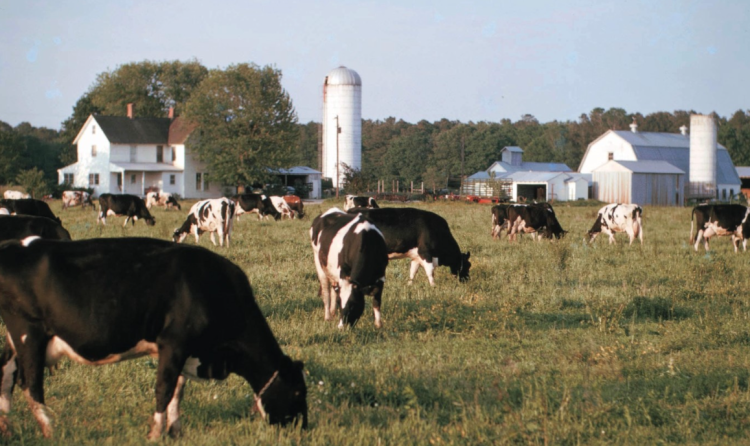 Artwork: by Donald Kurtz
Artwork: by Donald Kurtz
